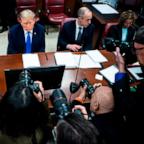Player-union attempt gets under way
— -- A group of Northwestern football players will line up against their university on Wednesday morning in a National Labor Relations Board hearing that could lead to historic, landmark change for college sports.
The hearing, scheduled for Wednesday morning at the iconic Chicago Rookery Building, will mark the next step in a process that will determine whether the players are student-athletes, as Northwestern and the NCAA insist, or employee-athletes who can form a union and bargain for benefits. On Jan. 28, Ramogi Huma, president of the National College Players Association, filed a petition in Chicago on behalf of the players at the regional office of the NLRB.
Known in American labor law as a "certification of representative" procedure, Wednesday's hearing will begin with procedural matters and scheduling. Things really get moving at the next scheduled hearing on Feb. 18.
Both hearings will be led by an agent of the NLRB, Joyce Hofstra, who will take testimony from players and the university. She also will gather documents and submit material to the agency's regional director for Chicago, Peter Sung Ohr, who will make an initial decision, likely within a few months. The losers in Ohr's decision may appeal to the NLRB in Washington, D.C., which is known as the "big board," then to a federal appeals court in Washington or back in Chicago.
Although the NCAA is not directly involved in the hearing, Donald Remy, its chief legal officer, said, "We will watch the developments and engage where appropriate."
Northwestern will be represented by Joe Tilson, an experienced and skilled labor lawyer and co-chair of the firm Meckler Bulger Tilson Marick and Pearson in Chicago. Tilson declined to comment, but Northwestern said in a statement that it believes "our student-athletes are not employees but students."
Insisting that athletics are "part of the overall educational experience and not a separate activity," Northwestern is expected to produce evidence of its support of its athletes and their classroom successes. According to NCAA data, the football players earn high grades annually and had a 2012 graduation rate of 97 percent, the highest in the nation. Their success, the university will argue, "is a testament to their academic abilities and confirms their status as students."
In addition to emphasizing the academic achievements of Wildcats players, the university will suggest that the issues raised by the players (long-term health coverage, additional scholarship funds and other benefits), are being discussed "at the national level" and are "outside the purview of Northwestern."
In response, the players will assert, as they did in a statement released Monday, that their "stellar academic performance is achieved in spite of their extraordinary athletic time demands, not a result of them." But they acknowledge Northwestern's suggestion that their issues are with the NCAA and not with the university. "A union will allow Northwestern players to negotiate for better protections allowable under NCAA rules," the statement said.
And that's not all, according to the players' statement: "Establishing a union at Northwestern is not the endgame. Rather, it is a first step toward building a nationwide players' association that will eventually have the leverage to eliminate unjust NCAA policies that affect players at each college."
The statement from the players offered no indications of what proof they will offer at the hearing, but it is expected they will present evidence that the "principal relationship between the athletes and the university is financial and economic and not academic," said Robert Bruno, a professor at the University of Illinois School of Labor and Employment Relations.
"They will show the profound level of control that the coaches have over their lives and demonstrate how they generate enormous wealth for the school that is completely unrelated to any academic objective," Bruno said.
In the leading academic article on the issue of whether college athletes are student-athletes or employee-athletes, Michigan State professors Robert and Amy McCormick argue that the "daily burdens and obligations" of football players "not only meet the legal standard of employee but far exceed the burdens and obligations of most university employees."
The professors, whose 87-page article published in the University of Washington Law Review provides a road map for the Northwestern players and their attorneys, interviewed dozens of Division I athletes and concluded that "playing football and basketball are wholly unrelated to their education and their degrees."
The activities of the athletes, the professors say, "are not required elements of any course of study at any university, nor are they requirements for the completion of any degree." Because playing football and basketball are "completely unrelated to the athletes' course of study," the services that the athletes perform for the university are "not educational but are, instead, economic."
Unlike graduate teaching assistants, who have been ruled to be students and not employees in previous NLRB decisions because they are supervised by faculty, athletes are supervised by coaches, the professors explain. "The fact that coaches, not faculty members, supervise the athletes' services demonstrates that players' work as athletes is not educational in nature."
The players are expected to offer evidence to the NLRB of the extensive control that coaches have over their daily lives, including practice schedules, weight room schedules, dorms, meals and even what they wear. They also will fight to be able to show the university income that results from their on-field efforts.
Even so, at least one labor law professor has said the players' chance at unionization is likely to fail.
"They are paying tuition to attend the university, and they are primarily students," said Zev Eigen, a professor of labor law at Northwestern. "It will be very difficult for them to convince anyone that they are employees."
Even though the university has "significant control over the athletes and is able to tell them when to practice and what uniforms to wear," Eigen said, "they are students first."
As an example, numerous courts have ruled that injured athletes are not eligible for medical benefits automatically available to employees.




